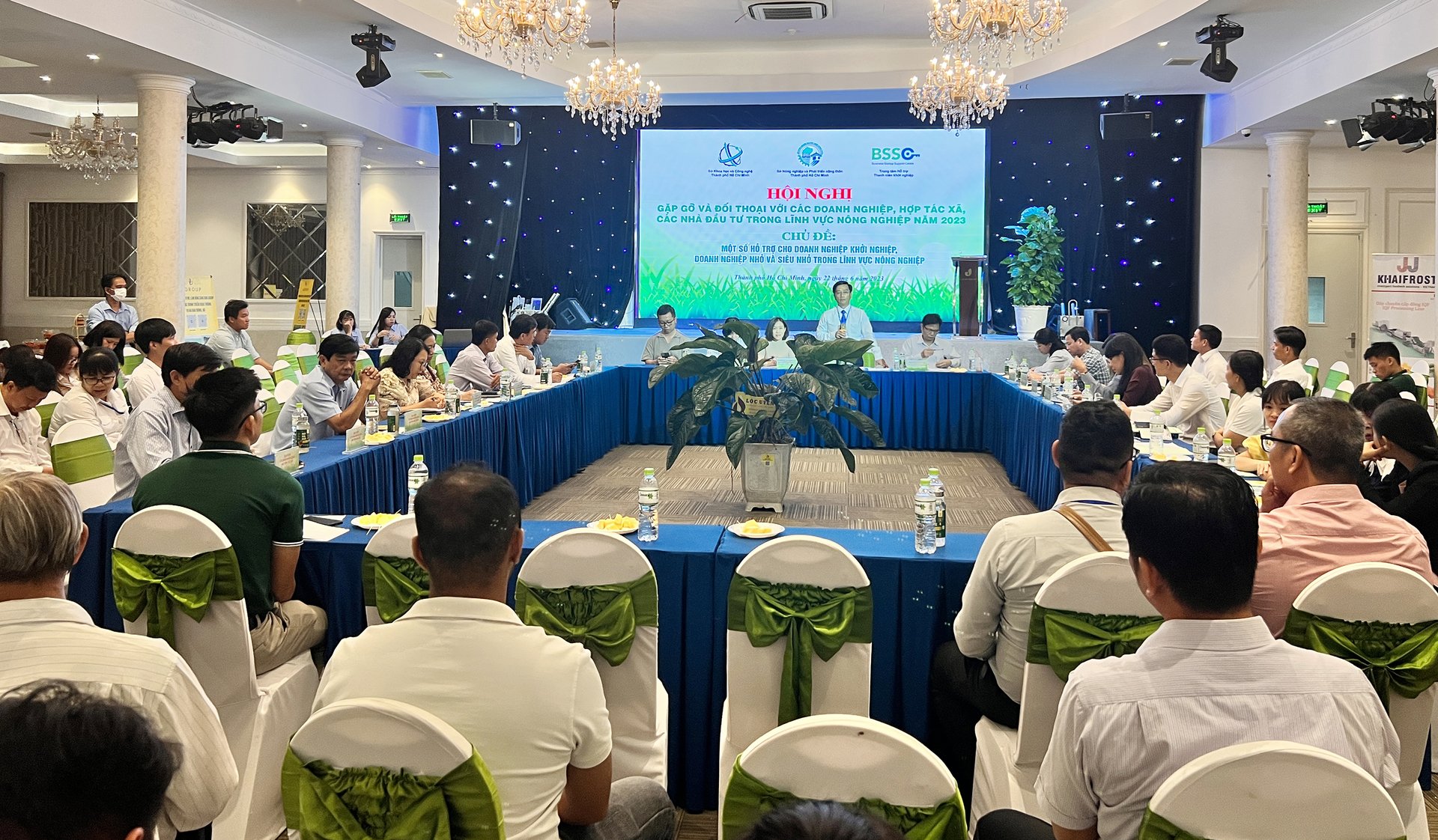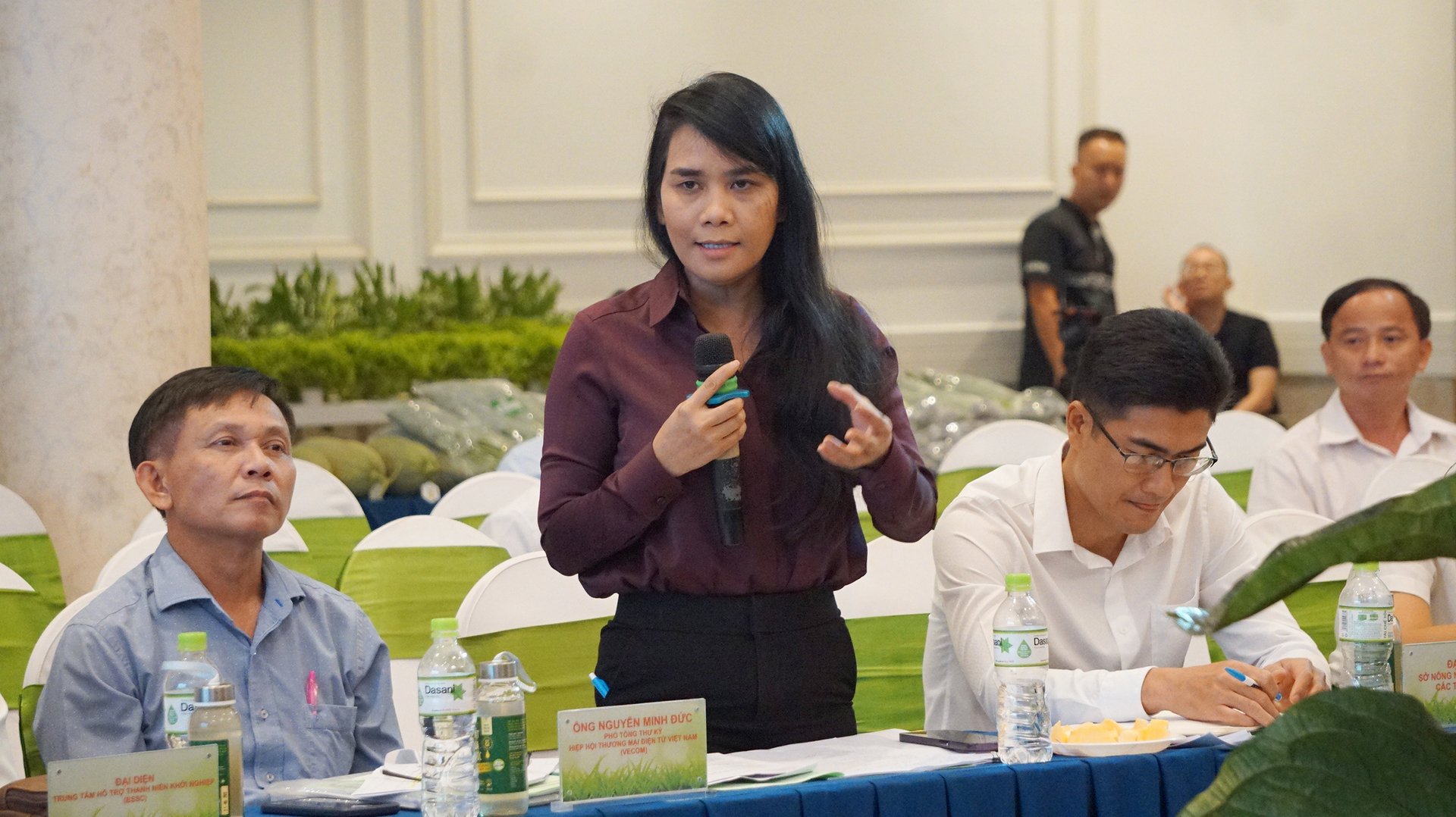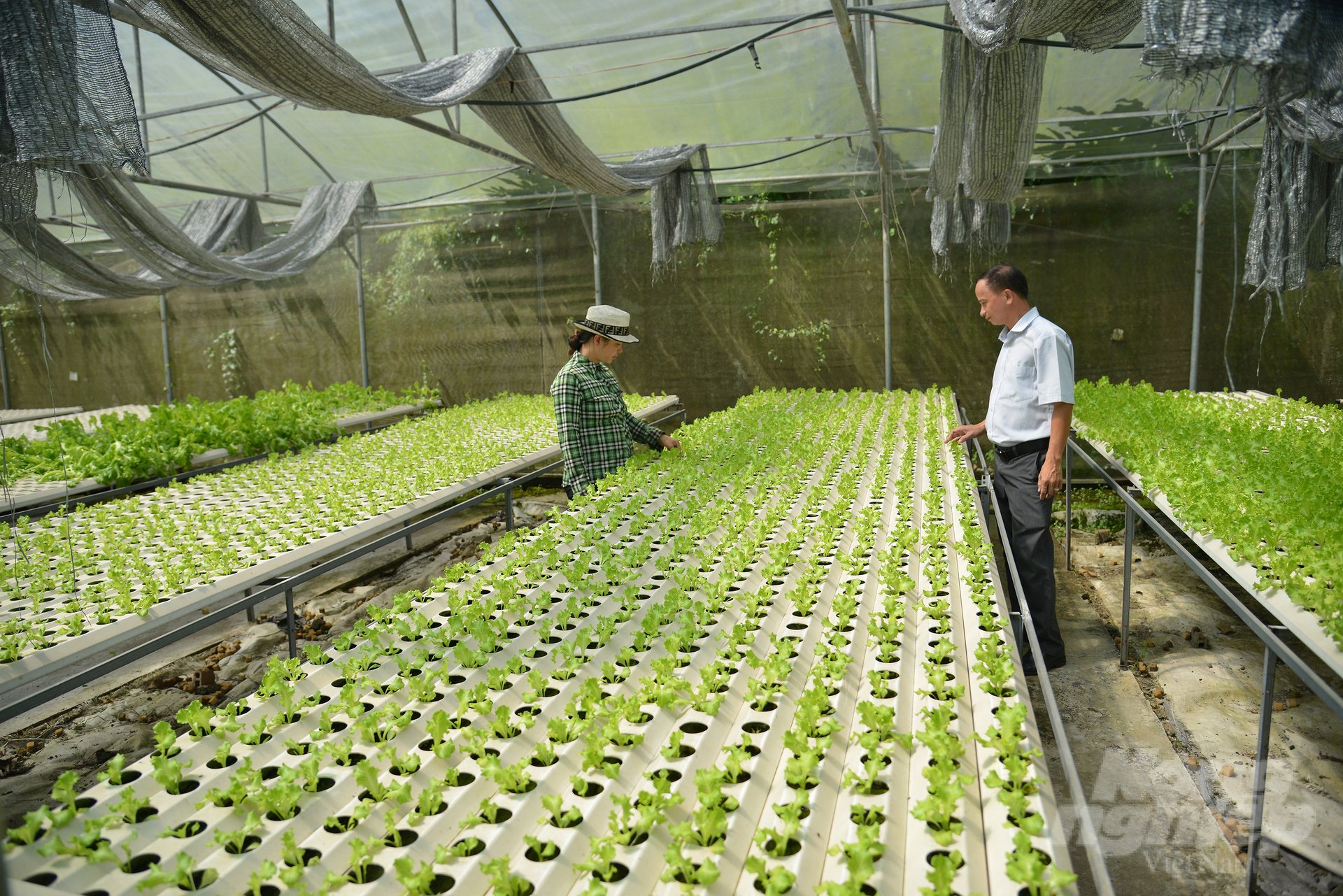November 22, 2025 | 20:51 GMT +7
November 22, 2025 | 20:51 GMT +7
Hotline: 0913.378.918
November 22, 2025 | 20:51 GMT +7
Hotline: 0913.378.918

Mr. Nguyen Huu Hoai Phu, Deputy Director of Ho Chi Minh City Department of Agriculture and Rural Development chairing the conference in Ho Chi Minh city. Photo: Nguyen Thuy.
A dialogue conference for businesses, cooperatives, and investors in the agricultural sector was held on June 22 in Ho Chi Minh city. According to Mr. Nguyen Huu Hoai Phu, Deputy Director of Ho Chi Minh City's Department of Agriculture and Rural Development, there are currently 4,300 agricultural businesses located throughout the city. Accordingly, they represent less than 1% of all businesses in the city, and generate a product value equivalent to one-fifth of city's average.
"The number of agricultural businesses is limited, and their economic value is lower compared to that of other sectors. As a result, Ho Chi Minh City must foster a young generation of agriultural start-ups in order to reinforce a youthful workforce in high-tech and AI agriculture within the next five to ten years" said Mr. Phu.
Ho Chi Minh City's Department of Agriculture and Rural Development will coordinate with the city's Department of Science and Technology, the Youth Science and Technology Development Center, and local Departments of Economic to support the youth in agricultural startups, with an emphasis on high-tech agriculture.
At the moment, the biggest obstacle for young people launching agricultural businesses, according to Mr. Phu, is the land use policy for construction of greenhouses and net houses. This reality is true regardless of their intelligence, science, or financial status. Furthermore, the lack of land for greenhouses and net houses is a challenge faced by many cooperatives and businesses lookingto invest in high-tech agriculture.
Ho Chi Minh City currently has 60,000 hectares of agricultural land. However, only 1% of this area has been converted to high-tech and urban agricultural production.
Ho Chi Minh City's Department of Agriculture and Rural Development aims to convert at least 10% of its 60,000 hectares of agricultural land by 2030. Subsequently, this goal will enable the city to develop urban, high-tech, and AI agriculture in a sustainable manner.

Ms. Hoang Thi Mai, Director of the Sub-Department of Rural Development under Ho Chi Minh City's Department of Agriculture and Rural Development, answering inquiries from businesses and cooperatives regarding support policies. Photo: Nguyen Thuy.
According to Ms. Hoang Thi Mai, Director of the Sub-Department of Rural Development under Ho Chi Minh City's Department of Agriculture and Rural Development, the city has deployed numerous mechanisms and policies to support agricultural producers since 2003. These support mechanisms and policies primarily focus on high-value crops and livestock that are compatible with Ho Chi Minh City's characteristics.
After 20 years of implementation, the city's preferential loan interest policy has supported over 24,000 businesses, cooperatives and households, with a total investment capital of over 13,000 billion VND. Accordingly, credit institutions have loaned over 8,000 billion VND to support agricultural production development. Additionally, the city spent 600 billion VND from its budget to fund agricultural activities.
Ho Chi Minh city's Department of Agriculture and Rural Development proposed a draft amendment that the People's Council of Ho Chi Minh City can utilize to promptly issue new policies with increased efficacy and practicality. Namely, investment in the field of science and technology previously required businesses to present a certificate of high-tech agricultural business, which will grant them access to larger loans compared to other sectors. However, according to new policies, agricultural businesses are only required to submit a detailed plan to the appraisal board.
In addition, outdated policies primarily focused on supporting the subject of production development. Conversely, new policies shift the focus to promoting output trade, and supporting businesses with loan interest from the city budget.

Many businesses and cooperatives in Ho Chi Minh City have applied science and technology to agricultural production. Photo: Nguyen Thuy.
At the conference, representatives from Ho Chi Minh City's Department of Science and Technology, the Youth Science and Technology Development Center and other relevant organizations suggested additional policies to support start-ups, and innovation, with an emphasis on high-tech and AI agriculture. Moreover, these policies will support agricultural producers in developing innovative agricultural projects that are in line with Ho Chi Minh City's urban agriculture orientation and development context.
According to Mr. Nguyen Minh Duc, Deputy General Secretary of the Vietnam E-commerce Association, businesses and cooperatives should focus on researching and applying AI to design product images, banners, SEO, create articles and advertisements, produce videos, build social media channels, automate customer services and so on. The application of AI technology will help the city's agricultural sector to develop rapidly as well as save costs.
Deputy Director Nguyen Huu Hoai Phu requested the Ho Chi Minh city's Center For Agricultural Consultancy And Support to coordinate with stakeholders and local economic departments to nurture the young generation with an aspiration for agricultural development.
Translated by Nguyen Hai Long

(VAN) The information was shared at the seminar 'Urban Agriculture - Solutions for Developing Green Spaces,' organized by the Kinh te & Do thi Newspaper and the Biotechnology Center of Ho Chi Minh City.
/2025/11/19/4141-2-132831_216.jpg)
(VAN) One of Japfa's outstanding solutions is implementing digital transformation and artificial intelligence (AI) to optimize operations, enhance productivity, and advance sustainable development.
/2025/11/19/4847-1-093540_448.jpg)
(VAN) The Gia Lai Provincial People’s Committee had a working session with the delegation of the U.S. Department of Agriculture, the State of Idaho, and representatives of the State's leading enterprises.

(VAN) Ca Mau has a sufficient foundation to become a strong regional aquaculture center, where production integrates the economy, the environment, and the lives of the people.

(VAN) SEIKI Group envisions itself as a pioneer in the ‘dual transformation’ of digital technology and green industry, standing alongside the Government and Vietnamese businesses in their pursuit of sustainable development.

(VAN) The VNGEONET network affirms Viet Nam's progress in mastering digital space, providing a precise positioning data platform to serve socioeconomic development.
/2025/11/14/3247-1-184556_35.jpg)
(VAN) Thai Nguyen is methodically implementing digital transformation in the livestock sector, laying the foundation for a modern, transparent, and sustainable agriculture.